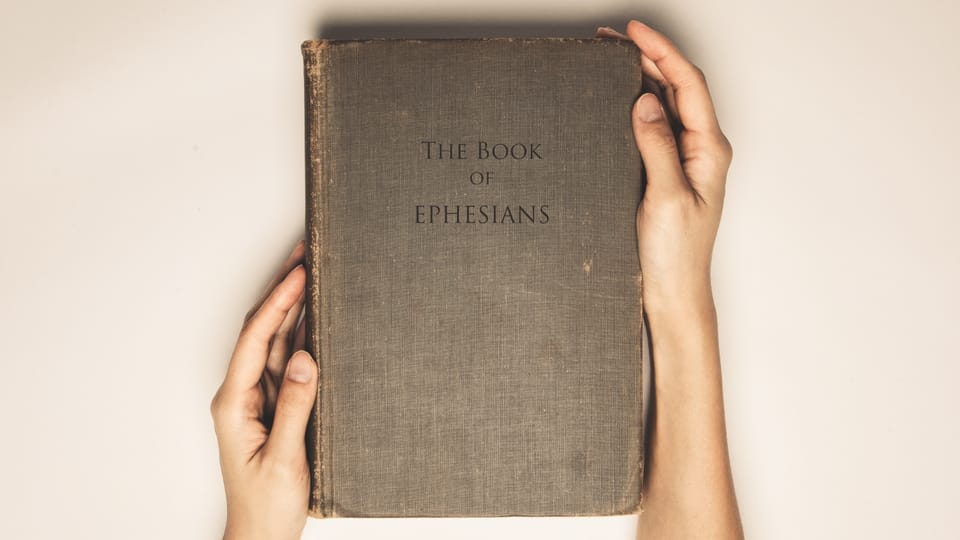Every Spiritual Blessing (Ephesians 1:3-14)

This summer we went swimming in the ocean in Chatham, Cape Cod. As we left the beach we actually read the warning sign that you're supposed to read as you enter the beach. If we had read it sooner, we probably wouldn't have let our kids swim in the water. It warned of dangerous rip currents and undercurrents and actually scared some of us in the family. Sometimes it's good not to know what you're getting into.
I feel a little like that as we look at today's passage. The passage we're about to look at is deep and dangerous water. We have a number of challenges in front of us this morning. First, it's one sentence in the original. Verses 3 to 14 are one long sentence in Greek, with clause piled upon clause. Second, nobody can really agree how to untangle this passage. One commentator said, "Every attempt to provide a strophic structure for [this passage] has failed." It's like an explosion of praise. It's hard to see where one concept ends and another one begins. Third, there are some deep and profound theological truths here. This isn't introductory theology. You could go deep into almost every phrase in this sentence.
So I almost feel like posting a warning sign as we look at this passage. There are dangerous currents, and this is not easy swimming. But it's definitely worth diving in.
Paul is writing to ordinary people who live in a diverse and important city in the area. It was a center of learning, and it was strategically positioned near some key routes. And it's written to some ordinary people, people just like us: some who were well off, some who weren't. This isn't some abstract treatise written to exceptional people. This is a letter written to people just like us.
It's important to keep this in mind because in these verses Paul pulls back the curtain and lets us peer in to witness a cosmic drama. Why does he do this?
If someone were to ask you about the drama you're a part of, you might say, "What drama?" You may discuss drama at work, school, or when your family gathers and different personalities clash. But chances are you'd be talking about a drama that wasn't too grand, or if it is grand, one that you'd rather not be part of.
But Paul wants his readers to know that they are part of a much bigger drama than they even know. The biggest drama is not your kids when they run wild. It's not when your in-laws come to town and drive you crazy. The biggest drama in your life is not trying to balance your checkbook at the end of the month. For a minute, Paul wants to pull back the curtain and let us see what's really going on in this world that we don't even know about.
This is especially important for us, because somebody's said that we now live in a world without windows. They're not talking about Microsoft Windows. It's a phrase from sociologist Peter Berger. People have always recognized that there is someone greater than themselves, something beyond this world. But we've lost this window to an unseen reality. More than ever, we need the message of this passage. We need to see that there's more going on than the things we see around us.
So Paul writes in verse 3: "Praise be to the God and Father of our Lord Jesus Christ, who has blessed us in the heavenly realms with every spiritual blessing in Christ." There's enough here in this one verse that we could just stop here. Paul praises God, because God the Father has blessed us in the heavenly realms with every spiritual blessing. In other words, we are participants – or should we say beneficiaries – of what God is up to in the world. We have been blessed because of what God is up to in the cosmic drama of redemption. As Paul is about to draw back the curtain, it's like he's saying, "This includes you, you know."
And then in verses 4 to 14 he explains exactly what God has been up to in this cosmic drama, and how it touches each person who is a recipient of his grace. Now, I told you that nobody quite knows how to structure this passage. You could study this passage according to time. You could study all the different spiritual blessings that he mentions in this passage – there are at least seven, by the way. But since I'm a preacher, and we all know that preachers like three points, I want to look at this passage according to the actions of the triune God within this cosmic drama.
1. God the Father initiated
Verses 3 to 6 speak of God the Father:
For he chose us in him before the creation of the world to be holy and blameless in his sight. In love he predestined us for adoption to sonship through Jesus Christ, in accordance with his pleasure and will— to the praise of his glorious grace, which he has freely given us in the One he loves.
So as these ordinary people listen, Paul pulls back the curtain to before the world even began and lets us see where this cosmic drama began: in the mind of God the Father. Verse 11 continues the same thought: "In him we were also chosen, having been predestined according to the plan of him who works out everything in conformity with the purpose of his will…" In fact, in this whole long sentence, God the Father is the subject of almost every verse. He is the main character, the one who is behind all the spiritual blessings we read about in this passage.
The cosmic drama of redemption began long before you existed. In fact, it began even before this world existed, before time began. It actually began in eternity when only God himself existed. Before any human acted or even existed, God not only knew that Adam would sin. He had already purposed to repair the damage done by sin, and to fulfill his original intention for humanity: to create a people for himself who are conformed to the likeness of his Son. And even more: he actually chose us to be adopted as his children. His purpose has always been to bring the people he chose into a personal relationship with him through Jesus Christ. Not only do we get to enjoy a relationship with God, but we also get to enjoy all the benefits that come from being a member of his family.
This is the doctrine of election or predestination. It's one that a lot of people struggle with because it brings up a lot of things that we don't understand. Does it take away our freedom of choice? Actually, no. You can choose anything you want. The only problem is that in our natural state, damaged by sin, we were completely incapable of choosing God. It's like gravity: I can throw an apple in the air, and once I release it, it can go any direction it would like, but because of gravity the only direction it's going to go is down. Unless someone reaches in from outside that apple and changes its direction, it's always going to go down. God's sovereign choosing of us is not about taking away our choice; it's actually enabling us through the Holy Spirit to choose him.
Someone's said, "Instead of destroying the value of human choices, election gives us a capacity for choosing that we did not possess previously as an unregenerate person" (James Boice).
What about those God hasn't chosen? It's so unfair, we think. But here again we have to admit that there are things that we don't understand. Just because we can't comprehend a reason doesn't mean that God doesn't have one.
How do I know if I am one of those God has chosen? Here's the beautiful thing: you never do up front. It's like those arguments I love to get going between couples when I ask which one of the two became interested in the other person first. If you are finding yourself drawn to Christ, you may feel like you are taking the initiative, but it is in fact because God is drawing you to himself. God initiates. He chooses us before we could ever choose him. Paul pulls back the curtain and says that before time or this world ever began, God initiated this cosmic drama, and this drama included you. God chose you before this world began.
By the way, this should make us incredibly humble, because we can't take any credit for our relationship with God. We didn't have anything to do with it.
It also gives us confidence. If we chose God, then our decision could change at any moment. Our salvation would be as unstable as we are. But our salvation is rooted in God's eternal choice, and nothing we do can thwart his purpose.
It also leads to gratitude. You see that this is exactly how Paul responded. Paul couldn't contain his gratitude that God had somehow chosen us for no good reason except for his own good pleasure. It's like the way they used to pick sports teams in school when we were growing up. Entertainer Garrison Keillor recalls the childhood pain of being chosen last for the baseball teams:
The captains are down to their last grudging choices: a slow kid for catcher, someone to stick out in right field where nobody hits it. They choose the last ones two at a time— "you and you"—because it makes no difference. And the remaining kids—the scrubs , the excess—they deal for us as handicaps. "If I take him, then you gotta take him," they say.
Sometimes I go as high as sixth, usually lower. But just once I'd like Darrel to pick me first and say, "Him! I want him! The skinny kid with the glasses and the black shoes. You, c'mon!" But I've never been chosen with much enthusiasm.
Just once, Keillor said, he wishes he could have been chosen with enthusiasm. But that's exactly what happened before this world ever began. If you are in relationship with God through Jesus his Son, it is because God chose you to the praise of his glorious grace.
You think your life has no drama. Before you were born, before this world even existed, you were part of the divine drama that God the Father initiated.
2. Jesus accomplished
I want you to notice something as you read this passage. Verse 3 says that we've been blessed with every spiritual blessing "in Christ." Verse 5 says that we've been predestined to adoption "through Jesus Christ." Verse 6 says that we've been given grace in Jesus, "the One he loves." Verse 7 says that it's in Christ that we have redemption – being bought out of slavery to sin – and also forgiveness of sins. And it tells us of the price that has been paid to bring us freedom and forgiveness: "through his blood." Verse 9 says that God purposed the mystery of his will "in Christ." Verse 13 says that the Gentile believers of this letter have been included "in Christ." All the blessings of God are found in Christ. Martyn Lloyd-Jones said:
If you leave out the "in Christ," you will never have any blessings at all…Every blessing we enjoy as Christian people comes to us through the Lord Jesus Christ…Paul is writing here to Christian people, and his concern is that they should understand and grasp the special blessings and privileges possible to them as Christians; and so he emphasizes that all those blessings come in and through the Lord Jesus Christ, and in and through him alone. You cannot be a Christian without being "in Christ." Christ is the beginning as well as the end. He is Alpha as well as Omega. There are no blessings for Christians apart from him.
But then look at verses 8 to 10:
With all wisdom and understanding, he made known to us the mystery of his will according to his good pleasure, which he purposed in Christ, to be put into effect when the times reach their fulfillment—to bring unity to all things in heaven and on earth under Christ.
As part of this cosmic drama, God has revealed a mystery to us. The term mystery in the New Testament usually means that something was previously hidden, but has now been disclosed. Paul is saying that we now know something that was previously hidden, and that God purposed this mystery to be put into effect when the times reach their fulfillment.
What has been made known? That it is God's intention to "bring unity to all things in heaven and on earth under Christ," according to verse 10. It's to make Jesus Christ the main point of all history. God has chosen Christ as the one in which he will sum up the entire cosmos, in whom he will restore harmony to the universe. Jesus Christ is the focal point of the entire universe. Everything that was fragmented, everything that is currently dislocated, everything that needs reconciliation and restoration will be restored to harmony in Jesus Christ.
I have to quote Lloyd-Jones again here:
The perfect harmony that will be restored will be harmony in man and between men. Harmony on the earth and in the brute creation! Harmony in heaven, and all under this blessed Lord Jesus Christ who will be the head of all! Everything will again be united in him. And wonder of wonders, marvelous beyond compare, when all this happens it will never be undone again. All will be reunited in him to all eternity. That is the message; that is God's plan. That is the mystery which has been revealed to us…These things are so marvelous that you will never hear anything greater, either in this world or the world to come.
You are part of a cosmic drama in which you have been blessed with every spiritual blessing, says Paul. And this drama was initiated by God the Father, but it has been accomplished by the death and resurrection of Jesus Christ. And it is God's intention that one day everything will be restored that is currently broken, that everything sad will become untrue. And all of this will take place in Jesus Christ, who is the main point of all creation. God initiated, but it is Jesus who died to ransom and forgive us, and he is the center, the climax, of the entire cosmic drama of redemption.
So God has initiated, and Jesus accomplished salvation and is the main point of all history. Finally:
3. The Holy Spirit applies
Verses 13 and 14:
When you believed, you were marked in him with a seal, the promised Holy Spirit, who is a deposit guaranteeing our inheritance until the redemption of those who are God's possession—to the praise of his glory.
So here we have had the work of the Father, Son, and Holy Spirit. The Father has chosen us and initiated this entire plan before the world ever began. Jesus Christ has ransomed us – bought us out of slavery to sin. He has forgiven us, and is the main point of all history. Now we have the Holy Spirit, who applies the benefits of all that God has purposed and that Jesus has done for us.
In fact, there are two images of the Holy Spirit's work here: seal and deposit. Seal has the meaning of ownership and protection. In those days, owners would brand their cattle and even their slaves to signify ownership, and to protect what they owned against theft. God stamps us with the Holy Spirit, signifying that we belong to him, and that he will protect us through the trials of our lives.
The other image that Paul uses to describe the Holy Spirit's work is deposit, or down-payment. The Holy Spirit is, in fact, the first installment of all the blessings that God has promised us. God isn't just promising us our final inheritance as his children; he's actually giving us the Holy Spirit, which is a foretaste of all that we will receive one day.
Notice, by the way, the phrase that keeps repeating throughout this passage in verses 6, 12, and 14: to the praise of his glory. This reminds us that God's ultimate purpose is not that we are saved. That's his purpose, but it's not his ultimate one. God's ultimate purpose is his glory; our salvation is a means to accomplishing that purpose.
There's much more here, but this is just a sample of what Paul tells us about the cosmic drama of redemption. I asked myself this week: why would Paul write to ordinary people in an urban center like Ephesus – like Toronto for that matter – and tell them all of this? And here's what I think the answer is: He wanted them to understand that their lives are about much more than making the kid's lunches for school tomorrow, or paying the bills, or making it through another week of school. You are part of the cosmic drama of redemption. And the more we can pull back the curtains and see what is really going on in this world, the more we will realize our place in what God is doing.
But notice, as we close, that Paul didn't write dispassionately. Verses 3 to 14 in one sentence. Nobody does that unless they're excited. When Paul pulled back the curtain, he was overcome with praise and was profoundly moved. God chose us before the creation of the world. He adopted us as his children, making us his sons and daughters with all the privileges that go with that. He has bought us from slavery to sin by the death of Jesus Christ, and has forgiven us. Our slate has been wiped clean. God says, "I will forgive their wickedness and will remember their sins no more" (Jeremiah 31:34). He has revealed his purpose in history to us. He has sealed us with the Holy Spirit, guaranteeing that we are his and that he will protect us. He has given us the Spirit as a down-payment, promising that we are going to receive much, much more later.
Praise God for including us in the cosmic drama of redemption! "Praise be to the God and Father of our Lord Jesus Christ, who has blessed us in the heavenly realms with every spiritual blessing in Christ" (Ephesians 1:3).





